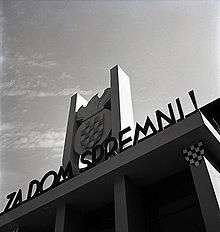Za dom spremni

Za dom spremni! (lit. "For home (land) - ready!") is a controversial salute used during World War II by the Ustaše movement. It was the Ustaše equivalent of the fascist or Nazi salute "Sieg heil".[2][3]
Usage during World War II
During World War II, the salute was used by the Ustaše as their official salute.[4] On 10 April 1941 Slavko Kvaternik, commander-in-chief of the Croatian Armed Forces and deputy of Poglavnik Ante Pavelić, proclaimed the establishment of NDH on Radio Zagreb, and ended the statement with Bog i Hrvati! Za dom spremni!.[5][6]
During this time salute was used in various ways, for example as "Za poglavnika i za dom spremni!"[7][8][9] (For Poglavnik and homeland ready) and in form of a question and answer: "Za dom?! - Spremni", "Za koga?! - Za poglavnika" ("For homeland?! - Ready!", "For whom?! For Poglavnik!"). There was also usage of Za Boga i poglavnika svoga - Uvijek spremni! on various flags of NDH.
Usage after breakup of Yugoslavia
The salute was used in Croatia and Bosnia and Herzegovina during the Croatian War of Independence and Bosnian War. Croatian Defence Forces, the paramilitary arm of the right-wing Croatian Party of Rights, used it as their official salute and included it in their logo.[10] This salute was an official slogan of the party's branch in Bosnia, Croatian Party of Rights of Bosnia and Herzegovina, until April 2012, when it was replaced by Semper fidelis.
Croatian singer Thompson used that salute at the beginning of his wartime song Bojna Čavoglave[11] and in the song Golubovi bijeli.[12] In the song Srce vatreno by Nered and Zapresic Boys the salute was also used in the middle of the song, but was later replaced with U boj.[13]
In 2011, a court in Knin dismissed the case against a craftsman who sold souvenirs which contained the salute Za dom spremni. The court ruled that accused didn't wear clothing or souvenirs with slogan that encourage national, racial or religious hatred, but instead he was selling them. While the former is punishable by law, the latter is not. The court ruling cited that "Za dom spremni is an old Croatian salute known throughout history" as a part of the defense statement, however, it didn't state any opinion on that subject.[14]
On November 19, 2013 Croatian international football player Josip Šimunić led the chant four times with the crowd in Zagreb after Croatia beat Iceland to qualify for the 2014 World Cup finals. He was subsequently banned for ten matches and fined by FIFA, and fined by Croatian prosecutors. This effectively banned him from participating in the 2014 World Cup finals. Simunic claimed that he was motivated by love of his people and homeland rather than expression of "hatred and destruction".[15]
Historian Hrvoje Klasić from the Zagreb University's Faculty of Philosophy stated that "za dom spremni" as a phrase has not been documented in any historical document prior to the formation of the Nazi puppet state Independent State of Croatia.[16][17][18]
Za dom
The words Za dom ("For home" or "For homeland") were used in the 19th century by count Josip Jelačić. When he went into battle, he would say "For home!" and the army would reply "ready to die!".[19]
The words Za dom were also used in Pavao Ritter Vitezović's 1684 work Odiljenje sigetsko about the Siege of Szigetvár,[20] in the opera Nikola Šubić Zrinjski composed by Ivan Zajc in 1876,[21] and several songs published in the mid-19th century issues of the Danica, the literary magazine published with the early Narodne novine.[22][23][24]
The phrase Za dom was documented as a salute in a 1939 issue of a Varaždin weekly Hrvatsko jedinstvo.[25]
References
- ↑ Romano, Jaša: Jevreji Jugoslavije 1941-1945: žrtve genocida i učesnici Narodnooslobodilačkog rata, p.106
- ↑ Ivica Kristović, Pozdrav 'Za dom spremni' ekvivalent je nacističkom 'Sieg Heil!', Večernji list, 22.11.2013
- ↑ 'Za dom spremni' je isto što i 'Sieg Heil'!, Danas.hr 09.01.2012.
- ↑ Zbornik dokumenata i podataka NOR-a. tom V - Dokumenti NOVJ - Borbe u Hrvatskoj, knjiga 32
- ↑ Proglašenje NDH - 10. travnja 1941., 16:00 (video)
- ↑ Hrvatski Narod - Posebno izdanje 10. travnja 1941.
- ↑ Izvještaj Župske redarstvene oblasti u Sarajevu od 2 oktobra 1943 god. o situaciji na području Župe, Zbornik NOR-a. tom IV - Borbe u Bosni i Hercegovini - knjiga 18 - oktobar 1943., page 452
- ↑ Zbornik NOR-a. tom V - Borbe u Hrvatskoj - knjiga 25 - ožujak 1944. II - Ustaško-domobranski dokumenti
- ↑ Hrvatski branik, year 1941, number 51, page 2
- ↑ Proclamation of the HOS Headquarters, 9 May 1992
- ↑ Bojna Čavoglave (video)
- ↑ Golubovi bijeli lyrics
- ↑ Srce Vatreno (video)
- ↑ Presuda iz Knina ne odnosi se na pozdrav ” Za dom spremni”
- ↑ "Croatian Soccer Star Banned from World Cup for Pro-Nazi Chants". breitbart.com. Retrieved 16 January 2014.
- ↑ "Za što su to točno 'spremni'?". tportal.hr. 2015-04-16. Retrieved 2016-06-03.
- ↑ "'Za dom spremni' kao pozdrav je uveden tek utemeljenjem ustaške NDH - Večernji.hr". Vecernji.hr. Retrieved 2016-06-03.
- ↑ "Predsjednica kaže da je inicijativa o pozdravu 'Za dom spremni' na razini provokacije, a povjesničari tvrde da nema veze s hrvatskom tradicijom –". Telegram.hr. 2015-08-25. Retrieved 2016-06-03.
- ↑ hr svijet net, retrieved 22 October 2015
- ↑ Oddiljenja Sigetskoga čentiri děla: S uvodom životu Nikole kneza Zrinjskoga, str. 50
- ↑ Libreto for the 1876. opera Nikola Šubić Zrinjski
- ↑ Danica Horvatska, Slavonska i Dalmatinska, issue 21, 28 May 1846
- ↑ Danica Horvatska, Slavonska i Dalmatinska, issue 6, 6 February 1847
- ↑ Danica Horvatska, Slavonska i Dalmatinska, issue 34, 19 August 1848
- ↑ Hrvatsko jedinstvo, year 1939, number 99, page 5